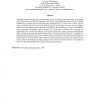Free Online Productivity Tools
i2Speak
i2Symbol
i2OCR
iTex2Img
iWeb2Print
iWeb2Shot
i2Type
iPdf2Split
iPdf2Merge
i2Bopomofo
i2Arabic
i2Style
i2Image
i2PDF
iLatex2Rtf
Sci2ools
114
click to vote
ECAL
1995
Springer
1995
Springer
Evolving Artificial Neural Networks that Develop in Time
Although recently there has been an increasing interest in studing genetically-based development using Artificial Life models, the mapping of the genetic information into the phenotype is usually as an abstract process that takes place instantaneously, i.e. before the creature starts to interact with the external world and is tested for fitness. In this paper we show that the temporal dimension of development has important consequences. By analyzing the results of simulations with temporally developing neural netwoks we found that evolution, by favouring the reproduction of Os which are efficient at all epochs of their life, selects genotypes which dictate early maturation of functional neural structure but not of nonfunctional structure. In addition, we found that development in time forces evolution to be conservative with characters that mature in the first phases of development while it allows evolution to play more freely with characters that mature later in development. Finally,...
Artificial Intelligence | ECAL 1995 | Functional Neural Structure | Genetically-based Development | Time Forces Evolution |
Related Content
| Added | 26 Aug 2010 |
| Updated | 26 Aug 2010 |
| Type | Conference |
| Year | 1995 |
| Where | ECAL |
| Authors | Stefano Nolfi, Domenico Parisi |
Comments (0)

